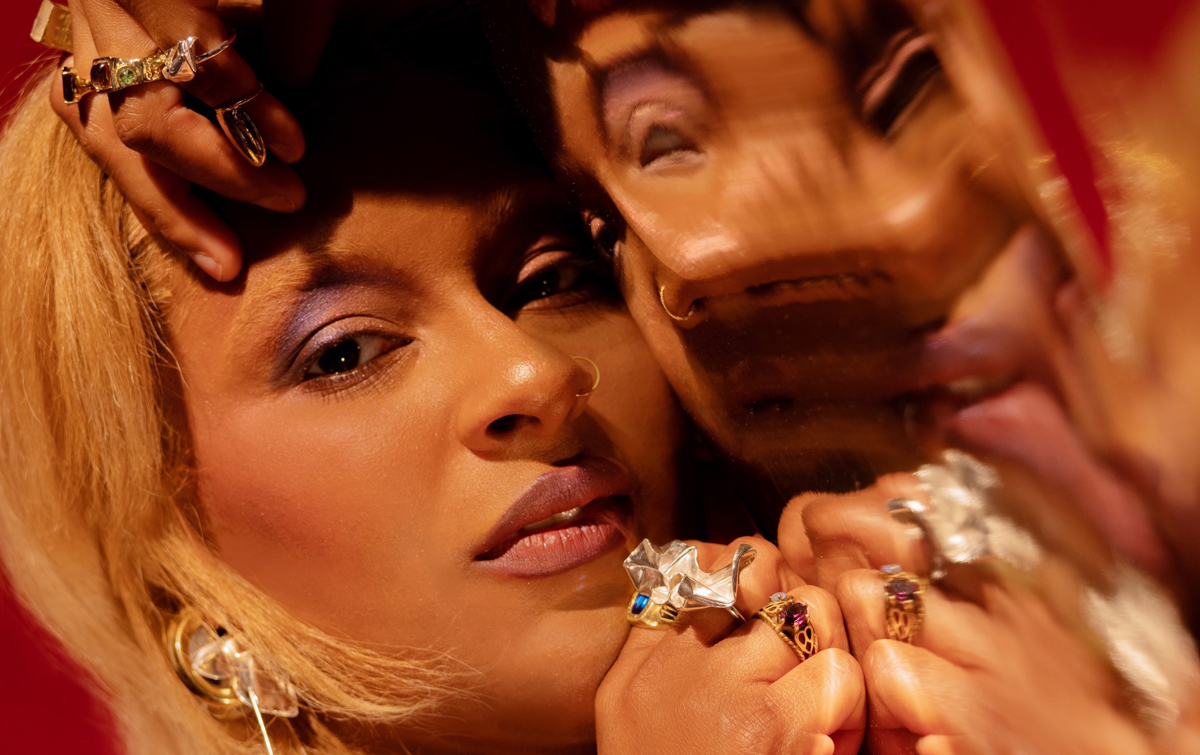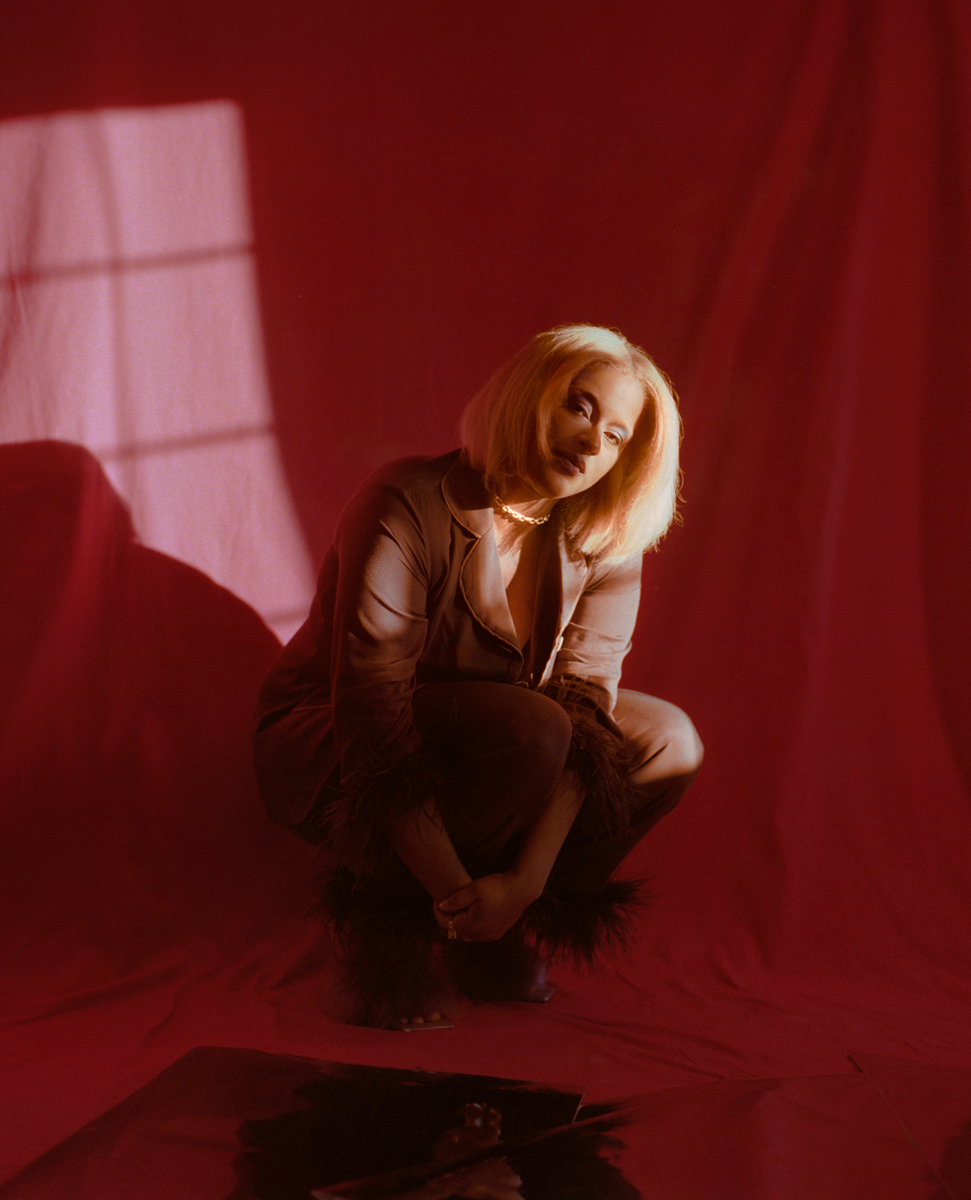 Harmony Holiday
Harmony Holiday
The singer celebrates heartbreak with a vengeance in her third studio album, I Killed Your Dog.

I Killed Your Dog, by L’Rain, Mexican Summer
• • •
When it feels safe to lose faith in almost everything, I maintain faith in music. This is black optimism. It’s encroaching, nagging, like an inability to fall out of love with a world you’d surely abandon were it not for its glorious and addictive sound, and the tendency toward song that overrides duller impulses. I’m in the cracked center of that collapsing world, riding its faithless chaos-spirits and listening to L’Rain’s (Taja Cheek’s) third studio album, I Killed Your Dog. Rebel music for the everyday romantic. The title insinuates a temperament coolly unfazed by the dissipation of romantic love and its descent into vengeance and latent desires to inflict shock and pain, but it also functions as a forensics kit for reluctant crimes of passion that begin glib and flippant, feigning detachment. The phrase carries that I didn’t mean to do it energy that all heartbreak and disabused sorrow harbors; we don’t set out to hurt one another in relationships, and yet, look around you, at all of the wounded on this endless killing floor, earth. We romance retaliation into casual myths where it’s safe to imagine going for blood. It’s as safe as the leap into the psychology of a deferred breakup: What if I just did it, would you join me in the criminal fantasy, could we exonerate ourselves in advance? The album’s strange and mutilating title phrase reminds that one might perform an act that pains the self to hurt another, thus exposing the dirty masochism of revenge fantasies, the end of sentimentality that is seeing these brutal dreams through, and the yearning intimacy of bitter endings.

L’Rain. Photo: Tonje Thilesen.
“Our Funeral,” the second track, following a heady and theoretical interlude introduction, swoons in the suicide pact of the end of love. Mourning one another brings spurned lovers closer as they separate and escape their union. The dog, the god of loyalty in the human subconscious, becomes the symbol of an almost unbearable breach in loyalty here, a shrug where embrace should be. There’s a fear of being earnest that outweighs a fear of being terrible. The wildest hearts believe earnestly that all love is eternal and end up with a canine corpse in the addled spirit if or when a romance ends, wondering how they could have betrayed themselves again. It helps to pretend to be evil for a while in the fallout, for long enough to embarrass the ego, call your own bluff, and recover what is real without blaming or punishing yourself. “Our Funeral” deals that autoerotic gash in a staggering of tones so warm and sweet with remorse you understand why the imaginary murder was necessary, an excuse to confess its opposite, a shy form of flirtation, reflexive temptation. The production by L’Rain’s team-as-ensemble, which includes producers Andrew Lappin and Ben Chapoteau-Katz, is so lush with intentional idiosyncrasy that you trust the crime scene and orient to it immediately as Cheek’s voice implores in a marching reverie, end of days, are you ready? It’s not so much a question as an invitation to loyalty’s finale, goodbye to what we had, the trustfall of the music outlasting the world it depicts. The title track gloats about the viscera of the crime with innocent somnambulant rigor, I killed your dog, it made me happy. It’s as if to confess, I broke your heart, it satisfied me.

L’Rain. Photo: Tonje Thilesen.
The just over thirty-five-minute album has a plot epic and swirling, committed to inconclusiveness; it’s premeditated grief. We find ourselves, having sacrificed a cherished animal and our own faithful souls, convivial in a garden dressing up for revolution. There’s just enough reveling in “5 to 8 Hours a Day” to channel the hysteria of folk revival, of community replacing the sullen universe of an unlucky love story. Just enough before it returns to address the lover, the suspicious spectator with teasing scorn, you didn’t think this would come out of me. To surprise the muse, you have to surprise yourself. Here the jauntiness is what’s surprising, the quickness by which letting go has made way for ecstatic joy. Jazz instrumentals blend seamlessly with territorial folk blurring, and you can no longer tell yourself you’re brooding, you’re on the other side, leaning into a new manifesto, a new way of life. The alibi gives way to haunting on the brief, incantatory “Sometimes,” punctuated by a gush of claps, a spark of remembrance with more pain than whimsy in it, a molasses timbre that fits the trickster sage descriptions of Toni Morrison’s Sula, or Nina Simone’s “See-Line Woman,” replacing the delicate and higher pitches of the first half of the album like a bridge into oracular solitude.

L’Rain. Photo: Alice Plati.
You cross it with optimism, spontaneous simplicity, the decision to keep surprising yourself by shedding masks and skins, or remembering that love is sometimes a distraction we try on and wear for a little too long when we’re bored with or afraid of facing ourselves. Alone with no one to project onto, desolation prays in echoes. “Uncertainty Principle” openly expresses the hope for a new belief system, and later, in “Knead Bee,” the self-replicating promise I will break my rules bucks that system. An outgrown way of being in the world is examined and discarded like the carrion of the dog, god, loyal soulmate in the quitting garden spawning the never revolution. “Clumsy,” the purest ballad on the album, retreats into lament at betrayal. How do you trust yourself when it feels like everything you do is bad for you?, the singer asks, in the daunted croon of a reliable narrator trapped in a duplicitous world and afraid, halting, but too bold to protect herself. Lived experience is worth the pain of delusion and disillusionment to this narrator, though she only admits it by changing tempos and moods midstream again and again and ending on a high note, explicitly unresolved, laughing off loneliness and re-enchanted with the personal. The color spectrum has changed by this final chapter of the album, it’s a soft lavender sunrise, whereas it began in broken sepia. The outro lyrics ask will you forget me, but so insistently that it turns into will you forgive me in the mind, a question to the self who knows its mischief by now, knows that every sabotaged love is sabotaged on purpose in order to retrieve this feeling of getting back to the interior, where all of life is, on the other side of breaking one’s own heart.
The dog, then, the deity and arbiter of returning home, is the self, the version of the self the lover knew—she’s gone. With that self, the loyalty expected, the sense of exactly how to find one’s way back—these falsified instincts have also departed. It’s fun, the album promises, being the departed, at least when you planned it, did the crime to make sure of it yourself. You want to take credit, be blamed, for this unlikely and irreversible recovery from the other. And it’s nice that it cannot be traced back to you, because the you who did it and lived it is dead. There’s solace in the noncommittal intensity of I Killed Your Dog; it’s the opposite of the bleak and numbed-out apology culture we’re steeped in—it’s shameless, estranged, deranged on purpose, and turning toward rehabilitation without codependency. We’ve come to expect one kind of downward spiraling pitch from black singers singing about love and romance, one cluttered way of processing, blue and grim and densely sultry, predictable. L’Rain provides a sound that feels accurate and fresh in its efforts to romanticize love without folding it into desperation, she lets emotions be as absurd as they are, she lets folk music be black music without disclaimers. We’ve been living in an era of jinxes and hyper-determined parallels, so that when an artist veers into her own crossroads and stops there to celebrate the unknowns, you’re freer and more resolved just for witnessing it.
Harmony Holiday is the author of several collections of poetry and numerous essays on music and culture. Her collection Maafa came out in April, 2022.